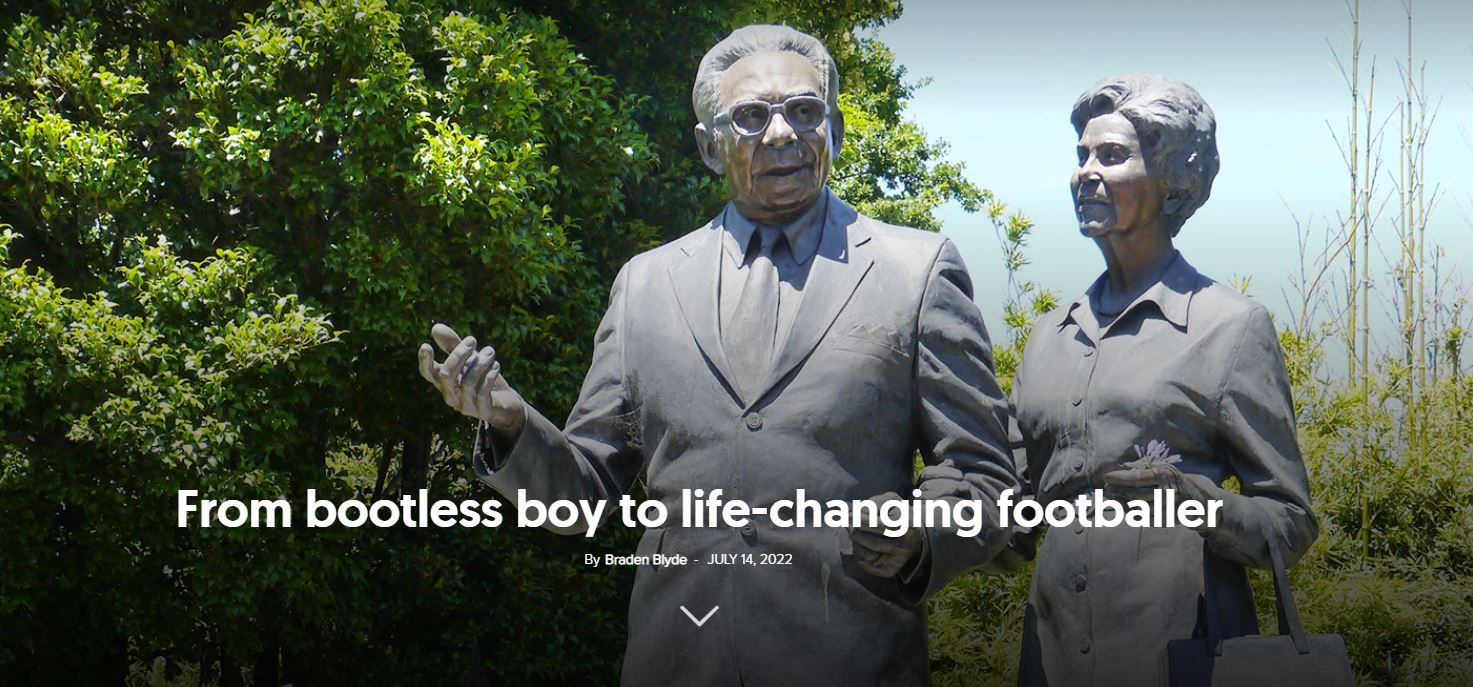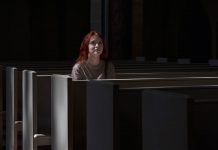“Finally, brothers and sisters, whatever is true, whatever is noble, whatever is right, whatever is pure, whatever is lovely, whatever is admirable—if anything is excellent or praiseworthy—think about such things. (…) I can do all this through him who gives me strength” (Philippians 4:8, 13).
“Florence?”
While waiting for the answer, teacher Bailey turned his gaze to the teenager who stood up but whose lips remained pressed together. The question hung on, almost awkwardly, in the air. Florence was in no hurry to answer. Perhaps she did not know the answer.
Or perhaps her thoughts were wandering far away from letters and words, travelling like children’s thoughts do, to realms unknown to adults. Suddenly, the whispered answer was heard from somewhere in the class, from a very beautiful girl who wanted to help her friend out.
“Eva! You should be ashamed of yourself!” Teacher Baily raised his voice this time to make sure all the children in the classroom would hear him. Another pretty girl stood up, surprised and ashamed.
“It’s not nice of you to tell her the answer. It’s dishonest. The fact that she’s your sister does not give you the right to break the rules. In life, everyone must take responsibility for what they do and don’t do, and everyone must get what they deserve.”
The teacher’s voice continued to echo in the silenced classroom, but Eva Beatrice Dykes no longer heard it. She only felt it like a tormenting pain that keeps looming even after sleep has overtaken you. She felt like all the eyes in the class were looking only at her. She wished she could cry. She was usually able to cry easily, but this time the tears had stopped. She could have told the truth. Actually, no, she couldn’t.
The beautiful girl who had whispered the answer was the best friend of her sister, Florence. How could she have said, “Teacher, it wasn’t me. It was my sister’s friend”? Even if what the girl had done was wrong, she meant well. Friendships are a precious thing that must be carefully preserved and one must respect other people’s feelings. Eva bit her lip and said nothing; she preferred to bear the scolding.
That’s what her uncle, doctor James Howard, had taught her: “Don’t mind the dishonest things people might say about you. Just make sure they’re not true.” She had learned a lot from her uncle, who was like a father to her. Her real father, James Dykes, had left his family when Eva was very little. Her mother’s brother offered to help her sister raise her children. They all moved into his spacious house.
The first clues
Contrary to what one might think about the above-mentioned event, both Florence Dykes and Eva Beatrice Dykes were eager learners. In 1914, Eva Beatrice graduated summa cum laude from the Liberal Arts College of Howard University. This is the highest distinction that could be awarded on an American university’s undergraduate degree. Eva Beatrice was carrying on the family’s tradition.
Three of her mother’s brothers had graduated with honours, and her father, James Dykes, had been a brilliant graduate who tutored many students in mathematics and Greek. Dr E. Smith, a former university colleague, would remember years later that while others had to work hard to understand and absorb the information in the lectures, Eva was quick to grasp everything and always worked with enthusiasm.
Unclassified
The young graduate of Howard University began to look for a job and managed to be accepted as a professor at Walden University. However, her uncle James thought otherwise. He convinced Eva Beatrice to enrol in a master’s program at Radcliffe College, and signed an application and handled the financial arrangements. Today, Radcliffe College is part of Harvard University, as the Radcliffe Institute for Advanced Study. Back then, Radcliffe was a liberal arts college for women (mostly focused on the study of the humanities).
The fact that Eva Beatrice Dykes had graduated from Howard University as head of her class did not impress the decision-makers at Radcliffe, who only accepted her as an “unclassified” student (in the American system, a student enrolled for studies, not intended to lead a diploma or an academic degree). It was no wonder: Howard was a university for African-American students, and Eva Beatrice Dykes was a young black woman. African-American schools had neither the material or human resources nor the prestige of universities for white people.
People of colour were considered inferior to whites, therefore incapable of reaching their intellectual level. For Eva Beatrice, the attitude of the people at Radcliffe was an intellectual challenge. She began to learn passionately, as she had done until then, absorbing tons of English and some Latin. At the end of the year, she graduated from all her courses with honours, and James Howard received word from Radcliffe that Eva Beatrice Dykes had been accepted to an undergraduate course.
Another year of intense work followed, with much English, and some French and Latin. At the end of it, Eva obtained her second bachelor’s degree, only it was magna cum laude. There had been one summa cum laude graduate that year at Radcliffe, and Eva Beatrice Dykes, along with 13 other students, had received the second-best academic degree, magna cum laude. In any case, her academic achievements remained impressive, and it appears that only two Bs had prevented her from receiving the summa cum laude distinction.
In recognition of her academic merits, after initially refusing to accept her as a fully enrolled student, beginning her sophomore year, Radcliffe awarded Eva Beatrice a scholarship of several hundred dollars (a considerable amount at the time, considering that in 1910 the average annual salary in the USA was less than 600 dollars). The Sunday Star publication, from Washington DC, included the following news in its issue of January 14, 1917:
“Word has been received from Boston that two young Washington women have won grades at Radcliffe College. Miss Elizabeth Brandeis, daughter of a Justice of the Supreme Court, is one of the fine juniors to rank with the ‘very high academic distinction,’ and Miss Eva B. Dykes is one of the seniors who has ranked with ‘marked excellence.’”
A place in history
On June 22, 1921, the Radcliffe PhD ceremony was marked by an oddity: of the seven candidates who were to be awarded the PhD title, one was dark-skinned. It was the first time that in the white female-dominated intellectual bastion that was Radcliffe, a woman of colour walked through the front door as an equal of the other graduates.
In the United States, Eva was the third African-American woman to receive a PhD title. However, she was the first to be eligible for the title, because she was the first to submit the thesis and all the necessary documents, in March of that year. Only the planning of the ceremony caused Eva Beatrice Dykes to receive her diploma one week after Georgianna R. Simpson and Sadie Tanner Mozel. Eva Beatrice Dykes’ success was on two fronts, that of a person who simultaneously belonged to two minorities: gender (female) and race (African-American).
Just 20 years earlier, the fact that President Theodore Roosevelt invited one of the most outstanding African-American scholars in the US to a dinner at the White House had generated seismic waves in the press of the time. And in Europe, less than 10 years before, more than half of the members of the French Academy had found it scandalous to receive a woman among the “illustrious”. This was the world in which the first African-American woman in the USA won the title of DSc. In fact, Eva Beatrice Dykes could have added another dimension to her minority status. By the time of the ceremony, she had belonged to a religious minority for almost a year: she was a Seventh-day Adventist.
After 15 years spent as a professor at Howard University, Eva Beatrice Dykes taught in the English Department of one of the Adventist higher education institutions in the USA, at Oakwood College, in Huntsville, Alabama. In 1973, Oakwood College decided to name its library of more than 600,000 volumes after Eva Beatrice Dykes.
Long after the graduation ceremony at Radcliffe, a student was preparing an assignment for a sociology course and interviewed Eva Beatrice Dykes. On that occasion, the student asked her, “What was your greatest thrill?” She might have expected the answer to refer to the graduation ceremonies at Howard or Radcliffe. Mrs Dykes’ answer was rather unexpected: the greatest thrill she had experienced was when she heard her mother’s last words on her deathbed, in 1945: “Eva, you’ve been a good daughter to me.”
After these words, Mrs Pumphrey Dykes fell into a coma and never regained consciousness. For Eva, these words produced the greatest joy of her life, perhaps because her mother used to always advise her: “Eva, do your best.” Her mother and Uncle James had been the heroes of her life. And her mother confirmed that, from her point of view, Eva had indeed done her best.
Robert Ancuceanu is a doctoral professor at the Faculty of Pharmacy within the “Carol Davila” University of Medicine and Pharmacy in Bucharest, Romania.




















